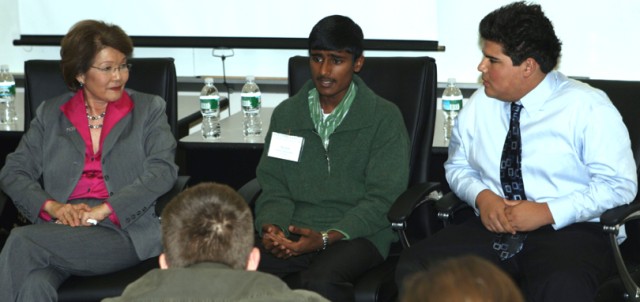
Leaders should know how hard Army life is on Soldiers' children and what they can do to help make life easier, advocates and military children told U.S. Military Academy cadets at a panel last week.
"There are many resources provided by the Army, and always look beyond the gates for help," Patty Shinseki, wife of former Army Chief of Staff retired Gen. Eric Shinseki and board member of the Military Child Education Coalition, said. "Seventy-five percent of your troops will live beyond the installation gates."
One resource for children is their friends. MCEC, an organization headquartered near Fort Hood, Texas, is designed to identify problems facing military children, specifically those caused by frequent moves.
The organization sponsored about a dozen high school students from across the country to visit West Point and learn how to mentor military children around them.
Along with participating in the panel Nov. 7, the students -- only some of whom are military children -- participated in team-building exercises; learned about leadership from cadets, Shinseki and Frances Hesselbein, a Presidential Medal of Freedom recipient and former CEO of Girl Scouts of the U.S.A.; participated in workshops about goal-setting and resilience; and listened to a lecture about leadership in crisis given by Lt. Gen. Eric Schoomaker, the Army's surgeon general.
Hearing Hesselbein was a highlight for a couple of the students. She told a story about being inspired to help others when she was 8 years old. She asked her grandmother about a set of vases and learned the vases were given to her grandmother by a Chinese immigrant who gave them to her because she was the only one in town who treated him with respect.
"She talked about a worldly view and a more personal view," Ariana Davis, a high school student from Alabama, said. "That's where you hit people, the personal view. You have to get involved."
During the panel, military children told cadets studying psychology and human development that moving around frequently as young children really didn't bother them. But, when they entered middle school and started forming strong bonds with their friends, moving became difficult.
"You feel unwanted because you have to make new friends all the time," Kevin Phipps, a high school student from Alabama who is about to move for the 14th time, said.
Kelsey Green, who lives near Fort Carson, Colo., said keeping in touch with her old friends is nice, but it's not the same as being near them.
Andrea Young has been at Fort Hood for 11 years.
"I'm the welcoming committee and the good-bye committee," she said. "I see people come and go, and as soon as we are friends, it seems like they have to leave again."
And while all of this seems like just part of the life of a Soldier, leaders should care about it because it impacts the well-being of their troops, Paul Callen, an MCEC board member, said.
"When you have children, you'll understand the Family stands behind Soldiers," Callen told cadets. "Family issues always come to the workplace no matter what."
Cadets were pleased to learn MCEC exists and to hear from people enduring the hardships of military life.
"It's nice to know this program is available," Firstie Sarah Anderson said. "I will encourage my Soldiers to get their own children involved."

Social Sharing